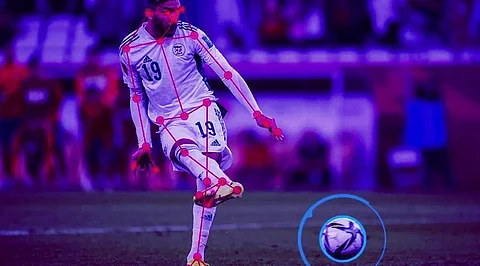

Artificial intelligence has many uses that aren't immediately obvious to us, but that make life easier in one way or another. We can see this by looking at a couple of the ways the technology is being used during the 2022 soccer World Cup that might not be apparent at first sight.
Like any other sport, the history of soccer is littered with controversial decisions that we'll never be 100% sure were right or not. For instance, Geoff Hurst's crucial goal for England against West Germany in the 1966 final has been fiercely debated ever since it was awarded, and while it's been suggested that modern technology proves it was a goal, not everyone is convinced.
A decision every bit as tight was made in the 2022 World Cup when Japan scored their second goal against Spain, which turned out to be the winner in the game. To the naked eye, the ball looked to have gone out of play before being played across to the player who scored. However, this was the perfect opportunity for the new FIFA virtual assistant referee (VAR) to be used.
This system uses elements such as AI, sensors in the ball, and a number of different camera angles to help analyze each situation. Following a long delay, the decision was taken to award the goal, with FIFA issuing conclusive evidence that not all of the ball had gone out of play before the goal was scored. Correct decisions like this that can be clearly shown will become more common, and the technology can be adapted to every type of sport.
With the huge amounts of data and so many stories to cover, it's no surprise to see that more than 12,000 journalists from all over the planet were accredited to work at the World Cup. Even so, they need some help in covering everything that happens here, and that's where automated journalism comes in useful. The basic data can be fed into an AI machine and it'll produce a natural-sounding report of the games that makes sense to a human reader.
The attempts to use AI to predict game outcomes have been less successful, with Al Jazeera's AI robot Kashef unable to spot the upcoming shock results that have taken fans by surprise. Predicting the outcome of games remains challenging for AI, with sportsbooks using a different kind of technology to allow supporters the chance to bet on games. This sports betting software gives constant, highly accurate feeds so that the operator can work out the odds of each possible outcome.
The authorities in Qatar are also using AI to control the crowds, as well as keep them cool and safe. With facial recognition technology, software that monitors possible crowd swells, and the ability to monitor and change the air-conditioning during the match, it's become the safest and most technologically advanced World Cup to date.
The advances we've seen in AI usage in this soccer World Cup are sure to filter into other sports in the next few years, meaning that we'll be hearing a lot more about it from now on.
Join our WhatsApp Channel to get the latest news, exclusives and videos on WhatsApp
_____________
Disclaimer: Analytics Insight does not provide financial advice or guidance. Also note that the cryptocurrencies mentioned/listed on the website could potentially be scams, i.e. designed to induce you to invest financial resources that may be lost forever and not be recoverable once investments are made. You are responsible for conducting your own research (DYOR) before making any investments. Read more here.
